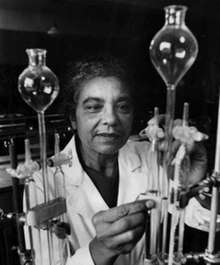Mary Elliott Hill
Mary Elliott Hill (January 5, 1907 – February 12, 1969) was one of the earliest African-American women to become a chemist.[1] She was known as both an organic and analytical chemist. Hill worked on the properties of ultraviolet light, developing analytic methodology, and, in collaboration with her husband Carl McClellan Hill, developing ketene synthesis which supported the development of plastics.[2][1] She is believed to be one of the first African-American woman to be awarded with a master's degree in chemistry.[3] Hill was an analytical chemist, designing spectroscopic methods and developing ways to track the progress of the reactions based on solubility.
Mary Elliott Hill | |
|---|---|
 | |
| Born | January 5, 1907 |
| Died | February 12, 1969 (aged 62) |
| Alma mater |
|
| Known for |
|
| Spouse(s) | Carl McClellan Hill (1907–1995) m. ca 1925 |
| Scientific career | |
| Fields | |
| Institutions |
|
Early life and education
Hill was born in the segregated small town of South Mills, North Carolina, on 5 January 1907, and had two brothers.[1] Her mother was Frances Bass, and her father, Robert Elliott, was a fireman.[1][4]
Hill began attending Virginia State College for Negroes, now Virginia State University (VSU), in 1925, gaining her bachelor's degree in chemistry in 1929.[1]
Career
After gaining her degree, Hill began teaching in 1930 at VSU's Laboratory High School.[1] In 1932 she taught chemistry part-time at the Hampton Institute, becoming a full-time faculty member in 1937.[1] From 1938 to 1942, she taught at VSU.[5] Hill also undertook graduate study at the University of Pennsylvania in the summers, awarded the first master's degree in chemistry to an African-American woman in 1941.[5][3] For the next year, she taught at Bennett College, and was appointed assistant professor of chemistry at Tennessee A & I State University.[5][6] The following year, she moved to Kentucky State University (KSU), where her husband, Carl McClellan Hill, was head of the chemistry department.[5] She was appointed associate professor, and acting head of the chemistry department from 1951 to 1952.[5]
At KSU, Hill studied ultraviolet spectrophotometry, as well as working in Carl Hill's team.[5] Carl Hill received funding for research on ketene synthesis, including from the National Science Foundation (NSF) and the U.S. Air Force.[7] Mary Hill worked on monomeric ketenes, which could undergo polymerization, which is a step in the creation of plastics.[6] The team used Grignard reagents to study chemical reactions in ketenes, with Mary Hill developing analytical methods for the work.[1] Hill was a co-author on more than 40 papers.[1] Hill instituted student chapters of the American Chemical Society at some of the historically black colleges and universities where she taught. Many of her students became chemistry professors, and she won awards for her teaching. In the 1960s, she observed that more women were becoming interested in science, but they lost interest because of the realities of research life at that time. Hill died in 1969.[8]
Personal life
Hill was married to Carl McClellan Hill, but the exact date of their marriage is unknown. One source says that they were married two years after she was introduced to him by a classmate at age 16[4] while another indicates that they married during her sophomore year at Virginia State College,[9] suggesting that their marriage occurred somewhere between 1925 and 1927. With her husband, she had three children.[10] In a 1963 newspaper interview, hobbies mentioned were reading, studying German and Russian, and enjoying flower arranging and watching football.[4] She was a member of Beta Kappa Chi.[6]
The Hills had just returned from a trip to England when she died from "a heart condition" she had had "for some time",[4] in King's Daughters Hospital in Frankfort, Kentucky[11] on February 12, 1969.[1]
Photo
- Photo (page 30) in African American Women Chemists,[1] source: The Courier-Journal, Louisville, Kentucky.[4]
References
- Brown, Jeannette (2012). African American Women Chemists. USA: Oxford University Press. pp. 29–33. ISBN -019974288X. Retrieved February 15, 2017.
- Spangenburg, Ray; Moser, Kit (2003). African Americans in science, math, and invention. New York, NY: Facts On File. p. 117. ISBN 1438107749. Retrieved February 15, 2017.
- Rayner-Canham, Marelene F; Rayner-Canham, Geoffrey (2001). Women in chemistry : their changing roles from alchemical times to the mid-twentieth century. Philadelphia: Chemical Heritage Foundation. ISBN 0941901270.
- "Mrs. Carl M. Hill, Educator's Wife, Dies at 62". The Courier-Journal (Louisville, Kentucky). February 13, 1969. Retrieved February 15, 2017.
- Warren, Wini (1999). Black women scientists in the United States. Bloomington, Ind. [u.a.]: Indiana University Press. pp. 114–115. ISBN 0253336031.
- Krapp, Kristine (1990). Notable black American scientists. NY: Gale. ISBN 0787627895.
- Crooks, Mabel B (October 18, 1954). "Chemistry Department Starts Research for AF". The Tennessean. Retrieved February 15, 2017.
- "9 black chemists you should know about". 9 black chemists you should know about. Retrieved May 10, 2020.
- Gates, Henry Louis (2004). "Hill, Mary Elliott". African American lives. Oxford [u.a.]: Oxford Univ. Press. pp. 402–403. ISBN 978-0195160246. Retrieved April 4, 2017.
- "Hill, Mary Elliott (1907-1969), organic and analytical chemist". American National Biography. doi:10.1093/anb/9780198606697.001.0001/anb-9780198606697-e-1301906. Retrieved May 10, 2020.
- "Mrs. Mary Hill Burial in Virginia". The Tennessean. February 15, 1969. Retrieved February 15, 2017.